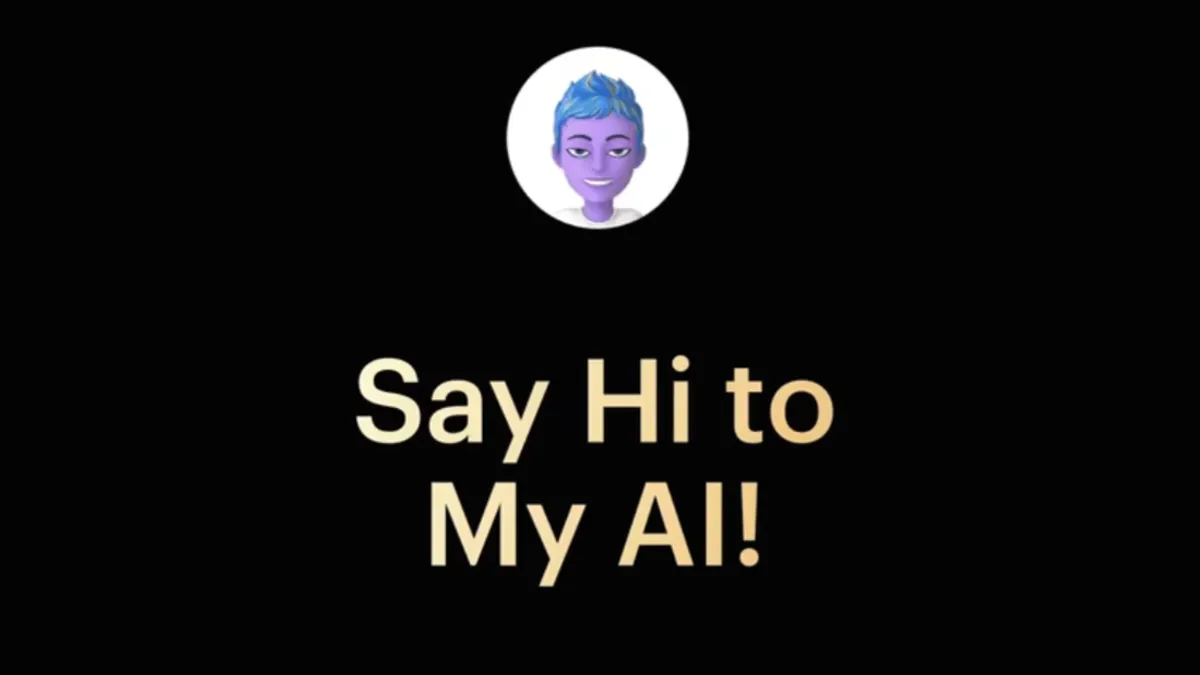Meta Platforms and Snap this week unveiled separate artificial intelligence (AI) initiatives, speaking to soaring hype around the technology and its growing importance to social media platforms. Discussions around AI have reignited following the buzz surrounding OpenAI's ChatGPT, which launched in November.
Meta’s chief executive Mark Zuckerberg on Monday shared a post detailing what the Facebook and Instagram owner has planned on the AI front, including the banding together of teams across the company that are already working on generative AI to form a new product group meant to “turbocharge” innovation. Meta has prioritized AI in the past, namely to streamline processes for marketers within its ads business.
While Zuckerberg noted that foundational work needs to happen before more ambitious paths can be pursued, he added that Meta plans to explore text-based experiences within Messenger and WhatsApp. Additionally, there are plans to look into image-based experiences through ad formats and Instagram filters, as well as video and multi-modal experiences. Down the line, more personable experiences could be in the works.
“In the short term, we'll focus on building creative and expressive tools. Over the longer term, we'll focus on developing AI personas that can help people in a variety of ways,” Zuckerberg wrote.
Meanwhile, Snap on the same day unveiled its own new addition, My AI. The chatbot runs using the latest version of OpenAI’s GPT technology customized for Snapchat. The feature rolls out this week to subscribers of Snapchat+, the platform’s $3.99-per-month subscription offering, and functions much like ChatGPT, with the capability to recommend gift ideas, plan trips and suggest different recipes. Offering the feature to subscribers as consumer curiosity in AI technology escalates could help Snapchat bolster its growing paid tier, which boasts over 2 million users.
“Their first-to-market My AI will not only give millions of users intimate access to AI in a way they may not have yet experienced, but it's a means to building a better-trained AI compared to whatever other platforms roll out later,” said Sami Hershkowitz, associate director of strategy for agency Formerly Known As, in emailed comments.
Eyeing a turnaround
Renewed investments in AI could support Meta and Snap as the two struggle during a period of increased uncertainty. Meta saw revenue dip 4% year-over-year in the fourth quarter, marking the company’s third straight quarter of revenue declines. However, not all was a low note, with Facebook reaching 2 billion daily active users during the period, which Zuckerberg attributed partially to advances in its AI discovery engine.
Likewise, Snap in Q4 reported revenue of $1.3 billion, a minimal gain from the same period the year prior. The company said that the macroeconomic climate will remain challenging for business in the early months of 2023. Last year, the Snapchat owner laid off 20% of its staff and outlined a restructuring plan with three core priorities: augmented reality, revenue growth and community growth.
In addition to potential revenue gains, Snapchat’s My AI could help foster the strong sense of community that it’s chasing after, expanding its core messaging function to include direct messaging with the chatbot and encouraging users to customize the wallpaper that appears during the chat and even personalize its name. The move sees Snap using My AI from more of a “friend” standpoint, versus others like Microsoft and Google that are looking to the technology to enhance search.
“The community is built on one-on-one, personal interactions, so this move makes relationship-building even stronger for users, the platform and potentially for brands,” Hershkowitz said.
While My AI offers no specified benefit to brands — though they can appear casually in conversation, Hershkowitz added — using the offering to boost Snapchat’s audience could entice new advertisers that are looking to reach its younger demographic. Brands have increasingly looked for ways to capitalize on the AI hype, including Mint Mobile, Snapple, and Coca-Cola, the latter being the first marketer to take advantage of a partnership with Bain & Company and OpenAI. However, a warning by the Federal Trade Commission this week cautioned marketers about overzealous claims around AI, which could keep platforms like Snapchat hunkered down on the basics.
“The short-term benefits are likely to be more organic in nature than anything an advertisement or marketer could influence,” Amy Rumpler, senior vice president of paid search and social at Basis Technologies, said in emailed comments. “For now, the focus seems to be on building user trust and engagement with the tools themselves.”
Open questions
Building trust with a technology that is notorious for questionable behavior and inaccuracies — as seen with Google’s Bard — could prove problematic. Snap in its announcement apologized in advance for My AI being “prone to hallucination,” adding that the technology can be “tricked into saying just about anything.” Promoting the chatbot’s personalization and “sidekick” behavior while also noting that it shouldn’t be relied on for advice could spur confusion, Rumpler said.
“In an environment where users feel like they’re talking to a personal friend when interacting with this chatbot, those types of issues could cause lasting problems, especially for younger users who may place misplaced trust in it,” Rumpler said.
To try to get ahead of potential missteps, Snap noted that it allows users to submit feedback on responses and added that it stores conversations to review for improvement — urging users not to share personal details. A focus on customization could see Snap pave the way for a new type of algorithmic discovery, Hershkowitz said, enabling users to feel more empowered over the content they receive in a current use case that sees users fed information in ways that sometimes feels a bit too on-the-nose.
And as others in the social media landscape continue to chase the AI hype, the way social media functions could one day take to an entirely different role, Rumpler added.
“I can see a future where the term ‘social media’ becomes outdated — if the content you’re watching isn’t shared by a friend but instead is fed to you by an algorithm based on your interests, and the ‘people’ you interact with aren’t actually people but are instead helpful AI chatbots,” Rumpler said. “‘Social networking’ takes on a whole new meaning.”























